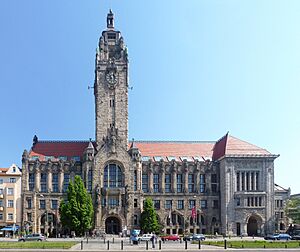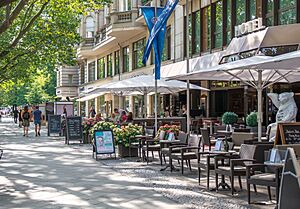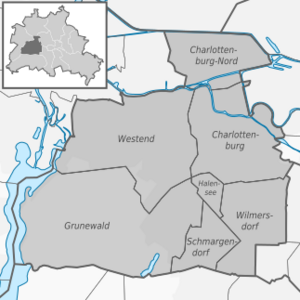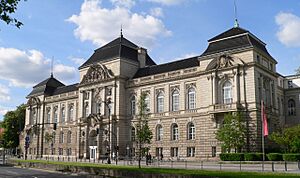Charlottenburg-Wilmersdorf facts for kids
Quick facts for kids
Charlottenburg-Wilmersdorf
|
|||
|---|---|---|---|
|
Borough of Berlin
|
|||

Charlottenburg Town Hall
|
|||
|
|||
| Country | Germany | ||
| State | Berlin | ||
| City | Berlin | ||
| Founded | 2001 | ||
| Population
(3431675)
|
|||
| • Total | 3,431,675 | ||
| Time zone | CET/CEST (UTC+1/+2) | ||
| Postal codes |
10585, 10587, 10589, 10623, 10625, 10627, 10629, 10707, 10709, 10711, 10713, 10715, 10717, 10719, 10777, 13627, 14050, 14052, 14053, 14055, 14057, 14059, 14193, 14197, 14199
|
||
| Dialling codes | 030 | ||
| Vehicle registration | B | ||
Charlottenburg-Wilmersdorf is one of the twelve boroughs in Berlin, Germany. It was created on January 1, 2001. This happened when two older boroughs, Charlottenburg and Wilmersdorf, joined together.
Contents
About Charlottenburg-Wilmersdorf
Charlottenburg-Wilmersdorf is located in the western part of Berlin. It includes both busy city areas and nice, wealthy neighborhoods. The borough shares borders with other Berlin boroughs like Mitte to the east and Spandau to the west.
After World War II, Berlin was divided. The area around Kurfürstendamm and Bahnhof Zoo became the main center of West Berlin. A famous landmark here is the Kaiser Wilhelm Memorial Church.
Many important places are in Charlottenburg-Wilmersdorf. These include the Technische Universität Berlin (a big technical university) and the Berlin University of the Arts. You can also find the Deutsche Oper Berlin (German Opera House), Charlottenburg Palace, and the Olympic Stadium here.
Who Lives Here?
In 2012, about 326,354 people lived in Charlottenburg-Wilmersdorf. Around 34% of these residents had family roots from outside Germany. This means Berlin is a very diverse city!
Many different groups of people live here. The largest groups with non-German backgrounds include:
- People from Turkey
- People from Poland
- People from Arab countries
- People from former Yugoslavia
- People of African descent
- People from Russia
- People from Ukraine and Iran
How the Borough is Divided
Charlottenburg-Wilmersdorf is split into seven smaller areas called localities. These are like smaller neighborhoods within the borough.
The seven localities are:
- Charlottenburg
- Wilmersdorf
- Schmargendorf
- Grunewald
- Westend
- Charlottenburg-Nord
- Halensee
Some of these localities, like Westend and Charlottenburg-Nord, were created more recently in 2004. This helped organize the borough better.
Sister Cities Around the World
Charlottenburg-Wilmersdorf has many "twin towns" or "sister cities." These are cities or regions that partner up to share culture, ideas, and friendship. It's a way for different places to learn from each other.
Some of its sister cities include:
 Apeldoorn, Netherlands
Apeldoorn, Netherlands Gladsaxe, Denmark
Gladsaxe, Denmark Lewisham, England, United Kingdom
Lewisham, England, United Kingdom Linz, Austria
Linz, Austria Międzyrzecz, Poland
Międzyrzecz, Poland Karmiel, Israel
Karmiel, Israel Pechersk (Kyiv), Ukraine
Pechersk (Kyiv), Ukraine Trento, Italy
Trento, Italy
Economy and Business
The economy of Charlottenburg-Wilmersdorf mostly relies on retail (shops and stores). The area around Kurfürstendamm, Breitscheidplatz, and Tauentzienstraße is very important for shopping in Berlin.

Other important businesses and places include:
- The Berliner Börse (Berlin Stock Exchange) is located in Charlottenburg. This is where companies buy and sell shares.
- The Royal Porcelain Factory in Berlin (Königliche Porzellan-Manufaktur Berlin or KPM) makes beautiful porcelain products.
- The Messe Berlin (Exhibition Grounds/Trade Fair Center) is a huge place where many trade shows and events happen.
- Airlines like Germania have their main offices in Charlottenburg-Nord.
Education
Charlottenburg-Wilmersdorf has many schools, with about 74 schools in total. Over 29,000 students attend these schools.
Higher Education
The borough is home to several important universities:
- Universität der Künste (Berlin University of the Arts) – a famous art school.
- Technische Universität Berlin – a leading technical university. In 2011, it was ranked among the top universities globally for engineering and technology.
- Bbw University of Applied Sciences
- ESCP Business School
- Touro College Berlin
Primary and Secondary Schools
There are many schools for younger students, including:
- Comenius-Schule (a primary school)
- Halensee-Grundschule (a primary school)
- Jüdische Traditionsschule (a Jewish primary and secondary school)
- Heinz-Galinski-Schule Charlottenburg (a Jewish primary school)
- Svenska Skolan Berlin (the Swedish School Berlin)
- Nelson-Mandela-School (an International School)
- Goethe-Gymnasium (a popular high school)
- Peter-Ustinov-Schule
- Evangelisches Gymnasium zum Grauen Kloster (a school run by the Evangelical Church)
Weekend Education
Some schools offer special classes on weekends, often for students to learn about their cultural heritage or language. For example:
- The Japanische Ergänzungsschule in Berlin e.V. (a Japanese supplementary school) holds classes at Halensee-Grundschule.
- The Zentrale Schule für Japanisch Berlin e.V. (another Japanese supplementary school) holds classes at the Comenius-Schule.
See also
 In Spanish: Charlottenburg-Wilmersdorf para niños
In Spanish: Charlottenburg-Wilmersdorf para niños
 | William M. Jackson |
 | Juan E. Gilbert |
 | Neil deGrasse Tyson |





